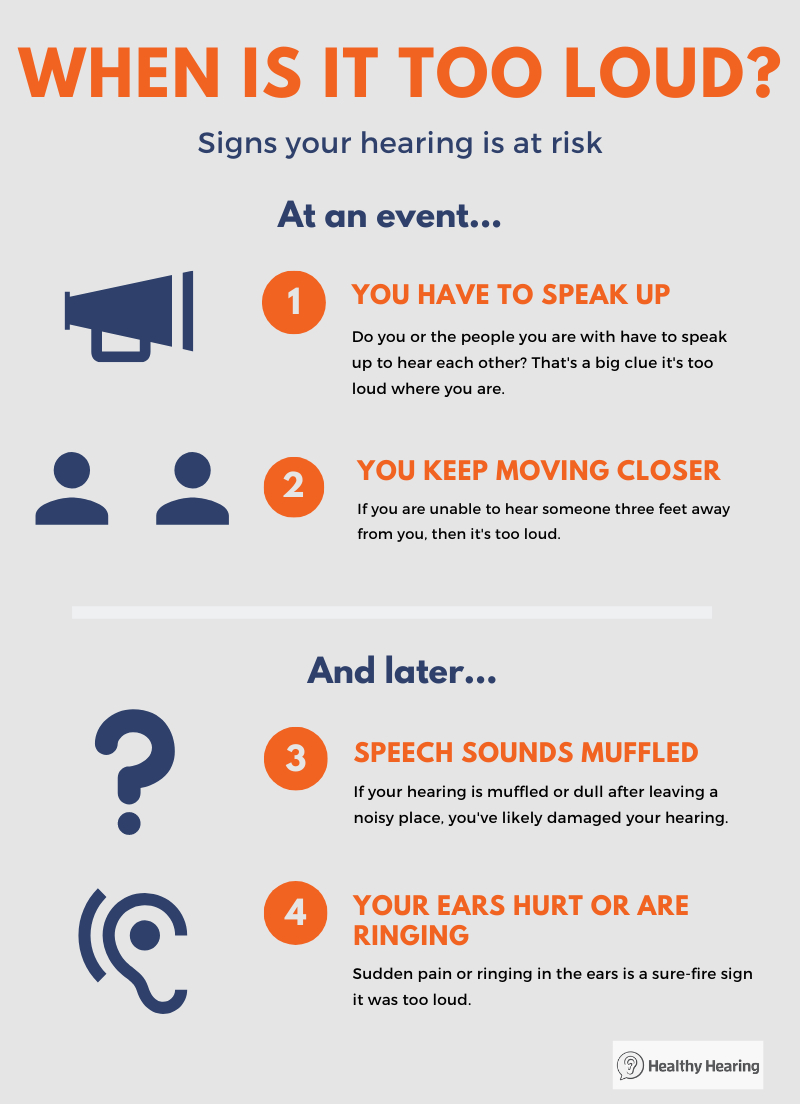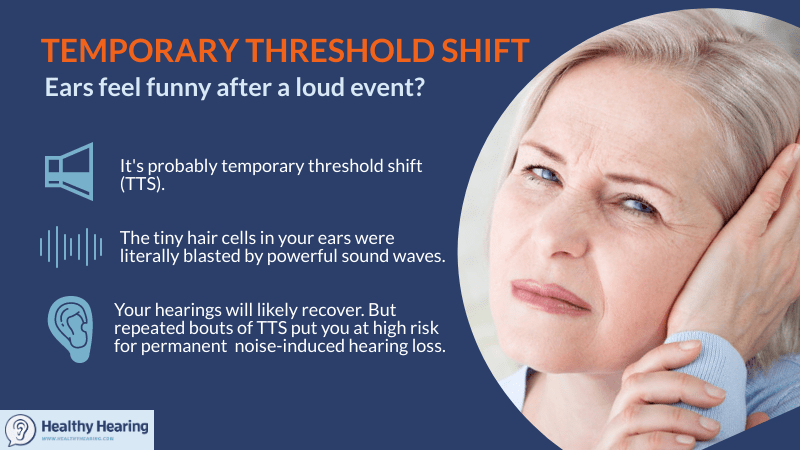Temporary threshold shift - what it is and why it happens - Healthy Hearing
We've probably all had this experience: You attend a concert, and when you leave the arena, your hearing is disconcertingly awry. Sounds are muffled, your ears feel full, and you may have ringing in your ears (aka tinnitus). This is what's known as temporary threshold shift (TTS), and as the name indicates, the temporary hearing loss or tinnitus that results is typically fleeting.
But those symptoms—the clogged-up ears, the ringing—are indications of damage, and repeated bouts of TTS could lead to permanent harm to your hearing.
What exactly is happening in your ear?
That blare of loud noise from a concert, too-high earbuds, a jackhammer while you work, does a number on the cells within your ear. To understand why that's a big deal, let's take a step back and examine how hearing works.
"In a nutshell, sound enters the ear and eventually stimulates the fluid in the inner ear (cochlea)," says audiologist Steve DeMari, director of business development and education at CaptionCall. The fluid creates waves over tiny rows of hair cells, he explains. "Each hair cell is tonotopically organized—or tuned—to a specific frequency for optimal transmission of the sounds you hear."
Your ears' cells are damaged
Loud sounds bombard your ears, pushing those hair cells that transmit sound over, DeMari says. For the hair cells, it's a traumatic experience—they remain bent over, even after there's no noise, which leads to ringing, fullness, and that temporary loss of hearing.

are very loud and can cause TTS.
TTS affects your hearing in the higher frequencies—that's how you hear consonant sounds, which are essential to conveying a word's meaning in English. (Without being able to hear a consonant, it's hard to distinguish between words like hat and cat, for instance.) This leads to a situation where you can hear someone, but can't understand them, DeMari says.
With TTS, however, your hearing levels will return to the baseline after a brief period. Your hearing threshold returns to normal, in other words.
DeMari describes a situation where you get your hearing tested before a concert, then experience TTS. After the TTS abates, however, if you got another hearing test, the results would be the same. (It's worth noting, however, that there could be damage to your hearing beyond the levels that tests measure, he adds.)
How big of a deal is TTS?
That's a bit tricky to answer. On the one hand, it's short-lived. Over time, DeMari says, the effects from TTS will likely go away, and "you'll be back to normal. Hence the name: It's temporary," he says.
But don't take too much solace in TTS being a temporary situation. It's not OK to go to concerts regularly and get your ears blown out—or be frequently exposed to any other loud noises without ear protection. Over time, if you experience TTS frequently, it can become a permanent threshold shift (PTS), according to a review of threshold shifts in the journal Otology and Neurotology.
That said, a one-time experience of TTS is unlikely to cause permanent damage, DeMari says. "When they say temporary, they truly do mean temporary," he says.
Why does TTS occur?
Simply put, TTS occurs due to loud noises. Concerts are a big offender—stand by the speakers at a show, and it might reach 110 decibels, DeMari notes.
"That's extremely loud," he says.
In general, sounds over 85 decibels can lead to noise-induced hearing loss, according to the National Institute on Deafness and Other Communication Disorders (NIDCD). TTS is essentially a noise-induced hearing loss—just one where the effects aren't long lasting.
Other situations that can lead to TTS include other exposure to loud noises, such as cranking music through earbuds, a firecracker that goes off right by you, an explosion, the buzz of a lawnmower, and so on.
How long does TTS last?
Remember, TTS is a temporary effect. It might last a few hours, a few days, or even a few weeks, DeMari says.
The longer you're exposed to a noise, and the more intense it is, the more intense and long-lasting the TTS may be, he says. But other factors can also play a role, including a person's age and sex, prior history of noise exposure, environmental factors, such as smoking, and diseases such as diabetes, according to the Otology and Neurotology review.
As DeMari puts it, people's susceptibility to TTS and their hearing differ.

How can you prevent TTS?
"It's highly unlikely you'll get a temporary threshold shift out of nowhere," DeMari notes. Exposure to noise is the culprit. To that end, avoiding exposure to loud noises will prevent TTS.
That's a guideline that seems easy, but can be challenging in the real-world, where you may find yourself unexpectedly exposed to loud machinery, or sitting in a movie theater where sounds can be between 74 and 104 decibels, per the NIDCD. (That lower range for movie theater sounds is likely fine, but the upper range is quite loud, and can cause harm.)
As much as you can, stay away from loud noises. Even small changes can make a difference: If you're at a concert, sit or stand away from the speakers, instead of dancing in front of them. Since duration matters, take breaks, too, stepping outside of the concert hall so that your ears aren't constantly blasted with loud noises.
And wear earplugs. If it's loud noises you don't need to hear (think: fireworks, the lawnmower), go for options that cancel all noise out, choosing earplugs with the highest noise reduction rating (NRR). But if you're going to a movie theater where the audio is super loud or a concert where you'll still want to hear the music, look for earplugs designed for musicians, DeMaris suggests.
You can find these online, or get custom fitted ones from an audiologist. These earplugs attenuate the sound, but don't degrade the music, he says.
When to seek out medical attention
If you have symptoms associated with TTS, but haven't experienced a loud event recently, make an appointment with an audiologist, DeMari recommends.
But if you're experiencing TTS after being exposed to noise, give it some time for the effects to abate, he recommends. If the problem lingers beyond several weeks, check in with an audiologist.

Comments
Post a Comment